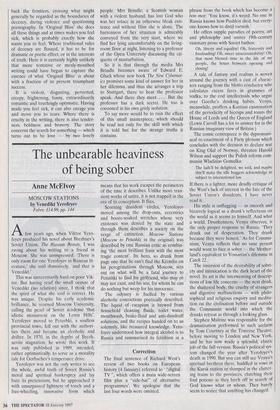The unbearable heaviness of being sober
Anne McElvoy
MOSCOW STATIONS by Venedikt Yerofeyev Faber, £14.99, pp. 144 Afew years ago, when Viktor Yero- feyev produced his novel about Brezhnev's Soviet Union, The Russian Beauty, I was raving about his writing to a friend in Moscow. She was unimpressed. 'There is only room for one Yerofeyev in Russian lit- erature,' she said dismisively, 'and that is Venedikt.'
This was unnecessarily hard on poor Vik- tor. But having read the small oeuvre of Venedikt (no relation) since, I think that the spirit of what she said is correct. He was unique. Despite his early academic brilliance, he scorned Moscow University, calling the pearl of Soviet academe 'that idiotic monument on the Lenin Hills'. Yerofeyev moved to Petushki, a soulless provincial town, fell out with the authori- ties there and became an alcoholic and drifter. In 1970, in the depths of Brezh- nevite stagnation, he wrote this work. It was only published in 1989, intended, rather optimistically, to serve as a morality tale for Gorbachev's temperance drive.
Yerofeyev was not the only writer to see the whole, awful truth of Soviet Russia's moral and spiritual bankruptcy and lay bare its pretensions, but he approached it with unsurpassed lightness, of touch and a free-wheeling, innovative form which means that his work escapes the perimeters of the time it describes. Unlike more tran- sient works of satire, it is not trapped in the era of its conception. It flies.
Scorning dissident circles, Yerofeyev moved among the drop-outs, eccentrics and booze-soaked wretches whose very existence was denied by the state and through them describes a society on the verge of extinction. Moscow Stations (Moscow to Petushki in the original) was described by one Russian critic as combin- ing 'the most brilliant form with the most tragic content'. Its hero, so drunk from page one that he can't find the Kremlin on his peregrinations through Moscow, sets out on what will be a fatal journey to Petushki to find his girlfriend, who may or may not exist, and his son, for whom he can do nothing but weep for his innocence.
The odyssey is fuelled by various alcoholic concoctions poetically described. The liquid of escapism is brewed from household cleaning fluids, toilet water, mouthwash, brake-fluid and anti-dandruff solutions, and the recipes handed on to us solemnly, like treasured knowledge. Yero- feyev understood how integral alcohol is to Russia and summarised its fetishism in a
phrase from the hook which has become a bon mot: 'You know, it's weird. No one in Russia knows how Pushkin died, but every- one knows how to distil varnish.'
He offers supple parodies of poetry, art and philosophy and unites 19th-century visionary prose with Soviet bathos:
Oh, liberty and equality! Oh, fraternity and freeloading! Oh, sweet unaccountability! Oh, that most blessed time in the life of my people, the hours between opening and closing!
A tale of fantasy and realism is woven around the journey with a cast of charac- ters ranging from the blotto conductor who calculates excess fares in grammes of vodka, to the cod intellectuals who argue over Goethe's drinking habits. Venya, meanwhile, proffers a Kantian examination of the periodicity of hiccups and toasts the House of Lords and the Queen of England (Lewis Carroll has a lot to answer for in the Russian imaginary view of Britain.)
The comic centrepiece is the dypsomani- acal re-enactment of a Party plenum which concludes with the decision to declare war on King Olaf of Norway, threaten Harold Wilson and support the Polish reform com- munist Wladislav Gomulka: The lads'll be delighted, we said, and maybe this'll make the idle buggers acknowledge us subject to international law.
If there is a lighter, more deadly critique of the West's lack of interest in the fate of the Soviet Union's dissidents, I have never read it.
His style is unflagging as smooth and bizarrely logical as a drunk's reflections on the world as it seems to himself. And what a world. Drunkenness, Venya observes, is the only proper response to Russia: 'They drank out of desperation. They drank because they were honest.' As for Commu- nism, Venya reflects that no sane person would want to face it sober — the Mother- land's equivalent to Yossarian's dilemma in Catch 22.
The inversion of the desirability of sobri- ety and intoxication is the dark heart of the novel. Its art is the interweaving of descrip- tions of low life concerns — the next drink, the shattered body, the cruelty of strangers and digestive malfunctions — with philo- sophical and religious enquiry and medita- tion on the civilisation before and outside the Communist world into which the drunks retreat as through a looking glass.
Stephen Mulrine was responsible for the dramatisation performed to such acclaim by Tom Courtney at the Traverse Theatre, before moving to London and New York, and he has now made a splendid, elastic job of the full version. Russia's political sys- tem changed the year after Yerofeyev's death in 1990. But you can still see Venya's spiritual brethren there, huddled in rows in the Kursk station or slumped in the clatter- ing trains to the provinces, clutching their foul potions as they lurch off in search of God knows what or whom. They barely seem to notice that anything has changed.


























































 Previous page
Previous page